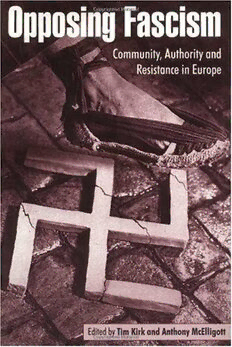
Opposing Fascism: Community, Authority and Resistance in Europe PDF
258 Pages·1999·1.05 MB·English
Most books are stored in the elastic cloud where traffic is expensive. For this reason, we have a limit on daily download.
Preview Opposing Fascism: Community, Authority and Resistance in Europe
Description:
This innovative volume draws together in a wide-ranging collection a series of new perspectives on the everyday experience of Europeans in the "age of fascism." The contributions go beyond the conventional stereotypes of organized resistance to examine the tensions and ambiguities within the communities, national and local, that opposed fascism. The authors show that under the pressures of civil conflict, occupation, and even everyday life, motives were rarely as pure and political alignments seldom as straightforward as our reassuring collective memories of fascism and war have led us to believe.
See more
The list of books you might like
Most books are stored in the elastic cloud where traffic is expensive. For this reason, we have a limit on daily download.
